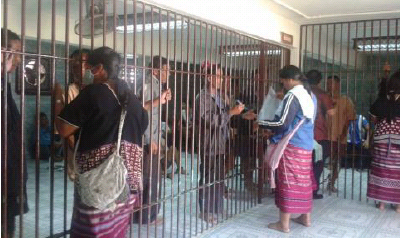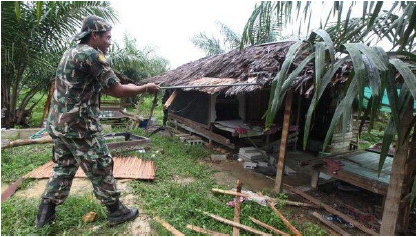Disponible uniquement en anglais.
On November 9th, the Northern Peasant Federation of Thailand (NPF) will be leading a walk to ask for the cessation of the arrests and evictions of forest community members since the issuance of the National Council for Peace and Order (NCPO) Order # 64 and a moratorium on the implementation of the Forestry Master Plan until public consultations are conducted. We will begin our walk from Chiang Mai and plan to walk to Bangkok to present our grievance
s to the NCPO. We will be joined by allies from all regions of Thailand.
Background
Abolishing the 2007 Constitution
On May 22, 2014, the military took control of the government and quickly cancelled the 2007 Constitution. This Constitution contained sections supporting Community Rights, include Sections 66, 67, and 85, which specifically provide communities with the rights to manage their natural resources.
NCPO Orders 64 and 66/2557
NCPO order 64/2557 was issued on June 14. It instructs government agencies to put an end to deforestation and encroachment on forest reserves nationwide. The military junta issued a subsequent order, 66/2557, on June 17, which stated that operations carried out on the basis of order 64/2557 must not impact the poor, people with low incomes, and the landless who have lived on the land prior to the order. However, military units have carried out the forced evictions without apparent regard for Thai law or order 66/2557. (i)
Forestry Master Plan
In August, 2014, a “Forestry Master Plan” with the aim of resolving the problems of forest destruction, trespassing of public land and sustainable management of natural resources was issued by the Internal Security Operations Command and the Ministry of Natural Resources and Environment. (ii) The over-arching goal of this plan is to increase the forest cover in Thailand from its current level of 33% of the country (17.1 million hectares) to 40% (20.5 million hectares) of the country should be designated as forests within 10 years. In order to increase the land designated as forests, the Forestry Master Plan has targeted provinces that they have labeled ‘crisis zones’ due to their understanding that these provinces have had many cases of forest encroachment and cutting of trees. Northern Thailand contains many of these ‘crisis zones’, which has made forest community members fearful that actions will soon be taken against them.
Evictions, Arrests, Detentions, Fines for villagers
Since NCPO Order 64 and the issuance of the Forestry Master Plan, soldiers are frequently raiding communities and arresting villagers, before quickly moving onto their next targets, to avoid confrontation with other locals. According to the Internal Security Operations Command (Isoc), 501 people have been arrested and prosecuted for forest and public land encroachment, while 55,000 Hectares of land has been confiscated in 68 provinces. In the North, over 200 cases have been filed against forest community members, mostly for possession of illegal wood. Many of the persons accused do not understand why these charges have been filed against them, as they feel that they had been living within the rules.
Among those accused was a 70+ year old ethnic Karen grandmother from Ban Tung Paka Village in Mae Hongson, who was visited by NPF after her arrest and was visibly distressed and crying. She died one week before her court date, but 37 others from her village were found guilty on October 29th of illegally possessing wood and logs at their homes. (iii) More than twenty remain in jail, as they have not been able to pay the fines or bails set for them.

Recommendations
The NPF agrees with the stance of The National Human Rights Commission of Thailand: the 2014 Forestry Master Plan can result in violations of the rights of the people and it should not be implemented until further consultation and amendments can be made. (iv) Furthermore, the permanent or temporary removal of individuals, families, or communities against their will from the homes or land they occupy without providing access to appropriate legal or other protection is considered a forced eviction under international law. Evictions should be carried out only in accordance with national law and international human rights standards.
Instead of implementing repressive Forestry Management schemes which harm the real forest protectors, we recommend the adopting of the “Four Laws for the Poor”, which aim to support community-based land and natural resource management- the most just and sustainable method to maintain Thailand’s precious forests and environment. i
i - http://www.prachatai.com/english/node/4408
ii - http://news.asiainterlaw.com/thailand-ncpo-approves-forest-protection-plan/
iii - http://www.bangkokpost.com/news/local/431594/activists-condemn-forest-blitz and http://www.bangkokpost.com/news/general/440355/encroachment-crackdown-targets-poor
iv - https://voicefromthais.wordpress.com/2014/10/02/nhrc-urge-ncpo-to-cease-master-plan-on-counter-deforestation-that-might-violate-communities-rights/
